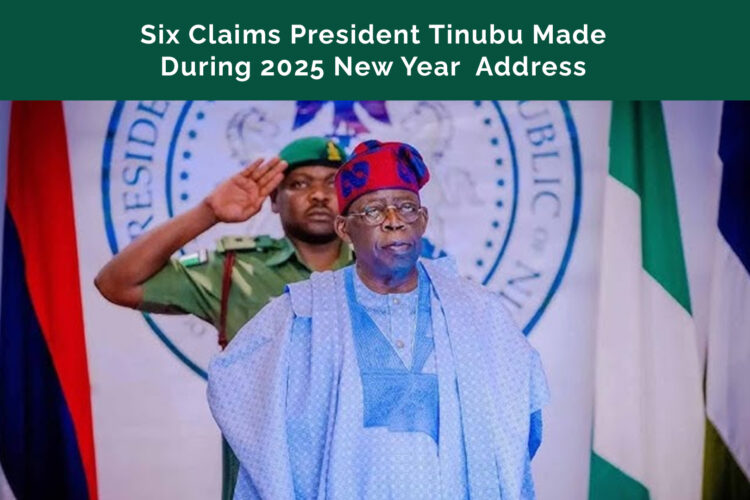On New Years’ Day, President Bola Ahmed Tinubu delivered a New Year’s Day speech where he touched on various topics. The address emphasised a positive economic outlook for 2025 and highlighted key achievements in 2024.
NV-A extracted some claims from the president’s address and went ahead to verify them.
CLAIM 1
There has been a surge in foreign investment – President Tinubu
In his speech, President Tinubu was quoted saying, “The stock market’s record growth has generated trillions of naira in wealth, and the surge in foreign investment reflects renewed confidence in our economy.”
VERIFICATION
Foreign direct investment, FDI, refers to purchase of an asset in another country, such that it gives direct control to the purchaser over the asset (e.g. purchase of land and building). In other words, it is an investment in the form of a controlling ownership in a business, in real estate or in productive assets such as factories in one country (such as Nigeria) by an entity based in another country (such as Saudi Arabia or United Kingdom).
Foreign inflows are a component of FDI, which is when an investor in one country establishes a lasting interest in a business in another country. Also, foreign inflows are the value of cross-border transactions that increase the investment foreign investors have in a country’s enterprises. This includes the value of direct investments, such as equity capital, reinvestment of earnings, and other long-term and short-term capital. FDI inflows are important for a country’s economy because they can be used to set up businesses or acquire assets.
In his Independence Day address, President Bola Tinubu stated that his administration had attracted over $30 billion in foreign direct investment, FDI, since taking office. However, Reuters reported that the data from the NBS indicates that in the first half of 2024, Nigeria’s foreign capital inflow more than doubled to $5.98 billion, compared to $2.16 billion during the same period in 2023. Nigeria’s FDI for the same quarter of 2024 also dropped to $29.83 million, marking the lowest level recorded based on available data up to 2013.
According to Business Day, foreign portfolio investments in Nigeria hit $3.48 billion in the first half of the year (H1 2024), representing a 360 percent year-on-year growth from the $756.1 million recorded in the half of 2023.
During the half year, foreign portfolio participation in Nigeria’s equities stood at $199.3 million. However, this was a 14 percent decline from the $230.8 million recorded in H1 of 2023. In Q1 of 2024, there was a foreign participation of $222 million in Nigeria’s equities. However, this fell to $8.5 million in the second quarter.
The data released by the NBS for 2024’s second quarter (Q2) on foreign capital importation revealed that Foreign Portfolio Investment, FPI in Nigeria in Q2 stood at $1.4 billion, down by 32 percent from the $2.08 billion recorded in Q1 of 2024. In year-on-year, the FPI grew by about 1,208 percent within the period, from $107 million recorded in the second quarter of 2023.
The NBS’ third quarter report stated that the Nigerian banking sector recorded the highest capital inflows of $3.8 billion in nine months of 2024, representing a 28 percent increase of $832.64 million at the end of 2023. While the total capital importation of the banking sector declined by 65 percent to $579.48 million in Q3 2024 compared to $1.12 billion in Q2 2024 and $2.07 billion in Q1 2024.
Nigeria also attracted a total of $7.2 billion in capital imports in nine months of 2024 compared to $2.8 billion in the same period of 2023. With all these foreign investments and inflows, the over $30 billion in FDI stated by the President is still not reflected in the total FDI accounted for from the start of the year to half.
VERDICT
Although Nigeria has experienced a mix of increase and decrease in foreign investment inflows in 2024, this does not translate to a huge surge to foreign investments, hence, the president’s claim is MISLEADING.
CLAIM 2
Fuel prices have gradually decreased.
In his speech, President Tinubu was quoted saying, “Economic indicators point to a positive and encouraging outlook for our nation. Fuel prices have gradually decreased, and we recorded foreign trade surpluses in three consecutive quarters.”
VERIFICATION
On May 29 2023, President Bola Ahmed Tinubu announced the removal of the fuel subsidy in his inaugural speech, afterwards, prices of premium motor spirit (PMS) surged across the country. Fuel prices went from 180-190 naira to 580-620 naira per liter in various parts of the country.
In the following months after the fuel subsidy removal announcement, the price of fuel in Nigeria has steadily been going up and varying in different parts of the country. At some point in Abuja, the state capital, fuel was sold at the price of 1100–1200 naira, amidst scarcity of the product.
A look at the Nigerian National Petroleum Company Limited, NNPCL, retail price revealed that fuel prices have dropped significantly in the last month. In Abuja, fuel price dropped to N965 per litre at NNPCL retail outlets. This is the second price reduction in under two weeks, following a drop from N1,060 earlier in December.
VERDICT
The claim that there is a gradual decrease in fuel prices is PARTLY TRUE as the reduction is within the context of its significant increase from 190 to 1200 per litre at the start of this administration. In December 2024, the Nigerian National Petroleum Company, NNPC reduced its price twice in two weeks and other fuel stations followed suit.
CLAIM 3
We recorded foreign trade surpluses in three consecutive quarters
In his speech, President Tinubu was also quoted saying, “Economic indicators point to a positive and encouraging outlook for our nation. Fuel prices have gradually decreased, and we recorded foreign trade surpluses in three consecutive quarters.”
VERIFICATION
The foreign trade surplus is an economic measure of a positive balance of trade,where a country’s exports exceed its imports. The foreign trade surplus is considered a good measure as it provides the country with extra funds that can be used for various investments within the country. It can also help to create employment and economic growth.
Nigeria’s foreign trade surpluses has been showing steady growth but it recorded a significant improvement in the 3 consecutive quarters of 2024. A Dataphyte infographic illustration collating the National Bureau of Statistics, NBS, published Foreign Trade data reported there have been surpluses between late 2023 and 2024.
It is clear that the three consecutive quarters for the year 2024 recorded better output than the previous year.
VERDICT
The claim that there have been foreign trade surpluses in three consecutive quarters. is TRUE.
CLAIM 4
Foreign reserves have risen
In his speech, President Tinubu was quoted saying, “Foreign reserves have risen, and the Naira has strengthened against the US dollar, bringing greater stability.”
VERIFICATION
Foreign reserves are assets held by a country’s central bank or monetary authority in foreign currencies or gold. It is also referred to as foreign exchange reserve or forex reserves, mainly used to influence or subsidise currency rates (which Nigeria’s CBN does), balance payment and maintain financial stability. The most common reserve currencies are the US dollar and the euro.
Nigeria’s foreign reserve was at $35,094,421,973.75 on May 30, 2023, a day after Tinubu assumed office as president. As of December 31, 2023, the reserve was at $32,912,429,900.17.
From the latest data by the Central bank of Nigeria (CBN), as of December 30, 2024, the Foreign Reserves stood at $40,884,855,767.06.
Below is a 5-month backward review of the Foreign Reserves according to dates as obtained from data of Nigeria’s apex bank from December 2024. According to the CBN data, Nigeria’s Foreign Reserves has maintained a steady growth from August 30, 2024 till December 30, 2024.
| Date | Current Foreign reserve (Gross) |
| 30/12/2024 | $40,884,855,767.06 |
| 29/11/2024 | $40,232,463,200.20 |
| 31/10/2024 | $39,785,523,194.43 |
| 30/09/2024 | $38,352,539,980.61 |
| 30/08/2024 | $36,305,654,424.25 |
Source: CBN
VERDICT
The claim that Nigeria’s foreign reserves have risen is TRUE.
CLAIM 5
Naira has strengthened against the US dollar
In his speech, President Tinubu was quoted saying, “Foreign reserves have risen, and the Naira has strengthened against the US dollar, bringing greater stability.”
VERIFICATION
On May 29, 2023 when President Bola Ahmed Tinubu was sworn in as the president of the Federal Republic of Nigeria the rate of $1 to naira was 460.72 naira. However, by mid-June 2023, the dollar was exchanging at 656 naira and in late June, it surged to over 820 naira.
By the end of the year, dollar to naira rate was at 896 naira, as of December 29, 2023. On February 29, 2024, the exchange rate was at 1,584 naira to one dollar and dropped between 1,145–1,500 in early July 2024. According to ExchangeRates.org, the rate surged to 1,600 naira by late July and has been fluctuating between 1500–1600 till the year end.
According to data from the Central Bank of Nigeria (CBN), the exchange rate of the naira to the dollar between December 2 to December 5, 2024 remained around 1,600 naira. The data also shows that from December 06 up until December 31, for 16 straight days, the rate remained around 1,500 naira.
As of December 06, Arise TV reported that “the Naira has appreciated to N1,587.29/$1 in the official market as EFEMS drives transparency and market efficiency.”
VERDICT
The claim that Naira is strengthening against the US dollar is MISLEADING, because the rate in 2024 increased by almost 50% from 896-1,600 and the recent appreciation of the naira reflects only a slight reduction from around 1,600 in early December to 1,500 in late December 2024
CLAIM 6
The stock market’s record growth has generated trillions of naira in wealth.
In his speech, President Tinubu was quoted saying, “The stock market’s record growth has generated trillions of naira in wealth, and the surge in foreign investment reflects renewed confidence in our economy.”
VERIFICATION
The Nigerian stock market experienced significant growth, with substantial increases in market capitalization and investor wealth measured in trillions of naira in 2024.
The Guardian Newspaper of January 1, 2025 revealed that the Nigerian equities market witnessed remarkable growth in 2024, returning N22 trillion gain to investors. The Nigerian stock market, which started the year with mixed sentiments, ascended to a 17-year high, occasioned by improved corporate performance across various sectors.
According to the Economic Confidential, the Nigerian stock market wrapped up yesterday with a 37.65 percent return for the year, placing it among the three highest returns worldwide.
The performance of the Nigerian market in 2024 was boosted by substantial increase in foreign portfolio investments (FPIs) and sustained demand from local investors. Foreign capital inflow had risen steadily from a low of about four per cent in mid-2023 to an average of about 16 per cent.
In a similar report, the Vanguard Newspaper stated that stock market investors gained over N20.994 trillion in the year 2024 following boom in activities which drove up the total value of shares on the NGX to N61.912 trillion at the close of the year yesterday from N40.918 trillion at the close of 2023.
VERDICT
The claim of significant growth in the Nigerian stock market, resulting in trillions of naira in increased wealth, is TRUE as it is being substantiated by recent market performance, the rise in the number of trillion-naira companies, and heightened investor participation.
CONCLUSION
Most of the claims made by the president in his New Year speech are LARGELY TRUE except for the claim regarding the surge in foreign investment which is MISLEADING as findings revealed from NBS published data that the investments recorded on Tinubu’s administration is in the millions, not in billions as claimed by the president in a former speech.



